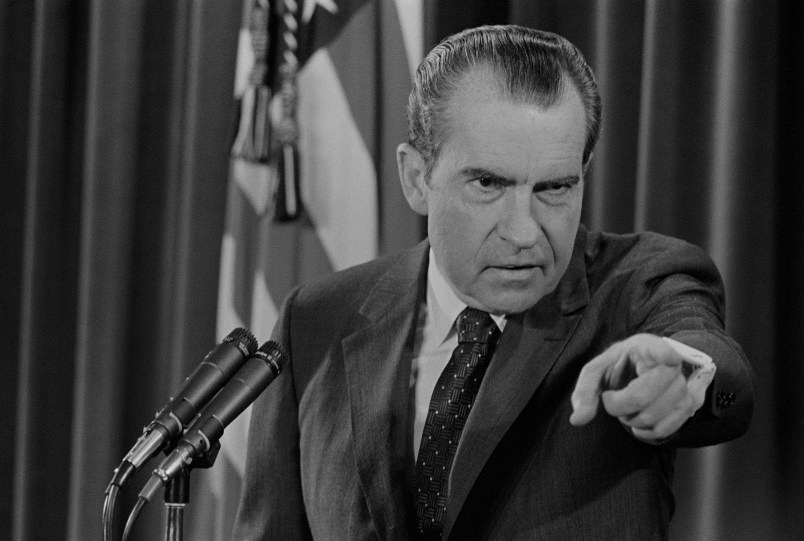Nothing, but nothing, enrages conservatives more than being accused of racism.
Yes, a whole wing of modern conservatism is rooted in the southern white struggle against civil rights. Yes, Republican politicians perpetually appeal to resentment of the beneficiaries of the “welfare state,” commonly (if mistakenly) understood as people of color. Yes, nearly all conservative political actors and writers treat minority grievances as an illegitimate projection of past injustices far past their point of relevance. Yes, in nearly every state where the GOP has the power and incentive to do so, their legislators are systematically seeking to make it harder for minorities to vote. Yes, the tea party movement has a foundational myth that the housing and financial crises which touched off the Great Recession were the product of loans made to uncreditworthy minority folk via the Community Reinvestment Act at the behest of the “black radical” group ACORN. And yes, the centrist technocrat Barack Obama has often been subjected to classic racist stereotypes in day-to-day conservative agitprop, as an alleged beneficiary of affirmative action, as a shiftless vacation-taker, as a boon companion to (and even a husband of) black radicals, and yes, as a Kenyan with a “neocolonial” outlook.
Since we cannot peer into souls and because it is entirely possible to favor conservative policy positions with no racial animus whatsoever, none of this evidence, of course, means that it is accurate to describe any particular individual conservative as a racist. Some Republicans frankly argue that the heavy Democratic voting proclivities of African-Americans, Asian-Americans and (to a somewhat lesser extent) Hispanic-Americans all but force GOPers to promote policies everyone knows have a disproportionate impact on minorities; why shouldn’t Republicans tend to their own bleached constituencies insofar as people of color won’t give their views a fair shake? More popular still is the theory (particularly beloved by the small tribe of African-American conservatives, but also alluded to by big-time figures like Paul Ryan and Rand Paul) that the Right’s deep sympathy for minority Americans requires a fight to “liberate” them from the Democratic Party “plantation,” where they are confined via dependence on government largesse (Conservatives like Star Parker, Ann Coulter and Rush Limbaugh have even argued that the welfare state was a conscious successor to Jim Crow).
And so, protestations of pure motives accompany even the most suspect of policies and messages — and intensify the conservative cries of “unfair!” and “race card!” when the r-word is attributed to their words and deeds if not their thoughts. It has reached the point where the very idea of racism — other than the “racism” of liberals playing the “race card” — has been delegitimized on the right.
This dynamic has led some liberals to call for a moratorium on accusations of conservative racism lest all communications break down. That was the thrust of a highly controversial piece by Jonathan Chait this week at New York Magazine, which richly documented the racial thread in recent conservative politics before despairing of a discourse in which accusations of racism rely on allegations of “secret motives and concealed evil.”
Tempting as it may be for white liberals to implicitly absolve conservatives of racially invidious motives, it’s palpably unjust to demand the same of minority folk. I would argue it is also unnecessary.
Like a lot of bad ideas and bad behaviors, “racism” is not a purely subjective phenomenon. There are arguably racist political strategies, racist messages, and racist policies that can be advanced by non-racists. Determining what is objectively racist is a matter of judgment, empirical evidence, and ultimately opinion. To use an example: during the 2012 presidential campaign the Romney/Ryan campaign heavily ran an ad accusing the president of “gutting” work-based welfare reform. The factual case for the ad’s allegations was incredibly weak, and it’s not as though “welfare reform” had been an issue earlier in the campaign, or indeed in any presidential campaign since 1992. No amount of white-wash can eliminate the strong impression that this ad was intended to persuade white voters that the first black president was walking back his party’s commitment to make welfare beneficiaries — perceived as primarily minority members — work. But does that mean Mitt Romney is a racist, subjectively speaking? I doubt it very seriously, but in the end, who cares?
In the end, describing a policy, a message, or even an item of political philosophy as objectively “racist” is no less legitimate than any other term of opprobrium. Personally, I find the Randian doctrine whereby anyone favoring progressive tax rates or business regulations is a “looter” conspiring with “losers” to steal the fruits of capitalist innovation even more offensive than racism, insofar as it treats large majorities of the U.S. population — including all those Democratic-voting minority members — as either morally debased or incorrigibly duped. I am not about to stop criticizing that point of view simply because its advocates do not subjectively view themselves as self-righteous cads hoarding the fruits of others’ labor. Nor are Randians about to stop calling me names for my own beliefs. Nor does all my church-going protect me from being called a “secularist” because I believe in a strict separation of church and state.
The reality a lot of us naturally want to avoid is the distemper and polarization in our political discourse is not simply the product of name-calling or rhetorical hubris or bad faith. Some of it has to do with genuine and very large differences of opinion about government, culture, and, yes, race. So much as I would like to find common ground with conservatives, and much as I know many of them have fine (subjective) motives: when I see racism, I’m going to call it what it is. Just avoiding the subject is not just bad politics: it is (subjectively, for me) an evasion and a lie.
Correction: This piece originally said National Review’s Kevin Williamson argued that the welfare state was a conscious successor to Jim Crow. Williamson insists he has actually explicitly repudiated the “plantation” theory. Mr. Kilgore regrets the error.
Ed Kilgore is the principal blogger for Washington Monthly’s Political Animal blog, Managing Editor of The Democratic Strategist, and a Senior Fellow at theProgressive Policy Institute. Earlier he worked for three governors and a U.S. Senator. He can be followed on Twitter at @ed_kilgore.









